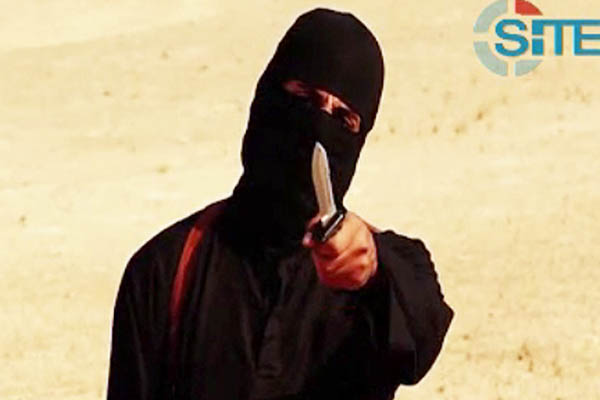
SITE Intelligence Group-HO—AFP
Call to arms comes as Washington and Moscow begin talks to ‘stay out of each other’s way’ in Syrian airstrikes.
The Islamic State group called on Muslims Tuesday to wage jihad on Russia and the United States, as Moscow announced it had intensified its air campaign against Islamic militants in Syria.
The call came as Russian President Vladimir Putin criticized Washington for refusing to cooperate with Moscow in its Syrian campaign, which is having an increasingly dramatic effect.
“Russia will be defeated,” I.S. spokesman Abu Mohamed al-Adnani said in a recording posted online, calling on “Muslims everywhere to launch jihad against the Russians and the Americans,” who it said were waging “a crusader war against Muslims.”
I.S. seeks not only to overthrow Syrian President Bashar al-Assad but is also vying with Al Qaeda affiliate Al-Nusra Front for jihadist supremacy in the country. Al-Nusra chief Abu Mohamed al-Jolani also threatened Moscow, saying its air war would have dire consequences.
“If the Russian army kills the people of Syria, then kill their people,” he said late Monday in a call to jihadists in the Caucasus. “And if they kill our soldiers, then kill their soldiers. An eye for an eye.”
“The war in Syria will make the Russians forget the horrors that they found in Afghanistan,” Jolani said, referring to the disastrous Soviet attempt to subdue the country in the 1980s.
Russia said Tuesday its air force had hit 86 “terrorist” targets in Syria in the past 24 hours—the highest one-day tally since it launched its bombing campaign on Sept. 30. Among them, it said, were several I.S. targets.
Washington and its allies—engaged in their own air war against I.S. in Syria and Iraq—accuse Moscow of targeting moderate Western-backed rebels and seeking to prop up Assad, a longtime Russian ally.
U.S. Defense Secretary Ash Carter said the two sides would hold another round of talks Wednesday on how to stay out of each other’s way in the skies over Syria. “Even as we continue to disagree on Syria policy, we should be able to at least agree on making sure our airmen are as safe as possible,” Carter said in Boston.
Putin meanwhile criticized Washington for refusing to share intelligence with Russia and accusing it of muddled thinking. “I think some of our partners simply have mush for brains; they do not have a clear understanding of what really happens in the country and what goals they are seeking to achieve,” he said.
The I.S.’s Adnani said the United States was weak and using Russia and Assad’s other ally Iran to strengthen its position in Syria, claiming Washington was willing “to forge an alliance with the devil.”
In Damascus, Russia’s embassy was struck by two rockets, sparking panic among some 300 people waving Russian flags and pictures of Putin in support of Moscow’s intervention. The Britain-based Syrian Observatory for Human Rights said the rockets were fired from the eastern edges of the capital, where Islamist rebels are entrenched.
Russian news agency Interfax quoted an embassy official as saying the rockets hit “embassy territory” but that there were no casualties. Foreign Minister Sergei Lavrov told reporters in Moscow it was an “act of terror.”
On Tuesday he met U.N. Syria envoy Staffan de Mistura for the first time since the Kremlin launched its campaign. Efforts have repeatedly failed to end Syria’s conflict, which has cost more than 240,000 lives and driven millions from their homes since it erupted in March 2011.
The fighting has intensified in recent weeks, with regime forces making gains with Russian support. The Syrian Observatory said fighters from the Lebanese Shia movement Hezbollah, which also supports Assad, arrived in the strategic Sahl al-Ghab plain to reinforce an offensive there.
Sahl al-Ghab, at the intersection of Hama, Latakia and Idlib provinces, has been a major target for Russian airstrikes. Thousands of fighters and supplies from Iran had also reached Hmeimim airport in Latakia province, the Observatory said.
A powerful rebel alliance that includes Al Nusra announced the launch of a major offensive of its own to take the central Hama province. It called on fighters there “to light the fire on the fronts inside the regions, so that hordes of Muslims will meet in Hama as liberators.”
Fierce fighting in the key Hama village of Kafr Nabuda forced pro-regime forces to retreat and killed 25 of them, the Observatory said.
Washington has been increasing support for rebel groups it backs in Syria, and one group said Tuesday that U.S.-made anti-tank missiles were turning the tide in a major battle in the country’s center and northwest.
Non-Islamist opposition factions say they are using the U.S.-made TOW missiles to halt an army advance that is backed by Russian air strikes in Hama and Idlib provinces.
“These rockets have played an important role in stopping the fierce attack by the Syrian regime and its Russian ally,” said Asaad Hanna, spokesman for the non-Islamist Division 101.
On Sunday, U.S.-led forces air-dropped ammunition to the Syrian Arab Coalition battling jihadists near I.S.’s northern stronghold of Raqa.
